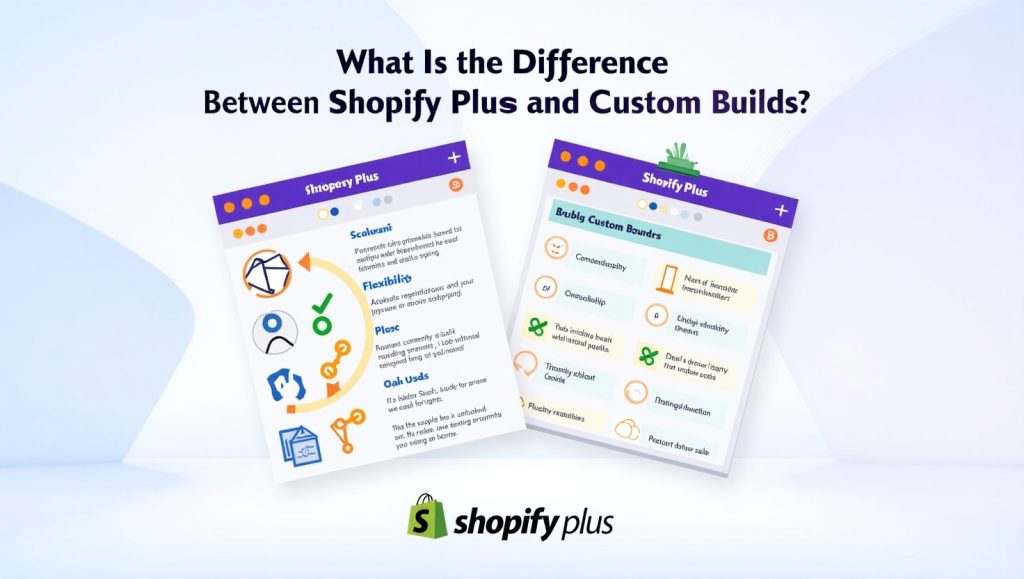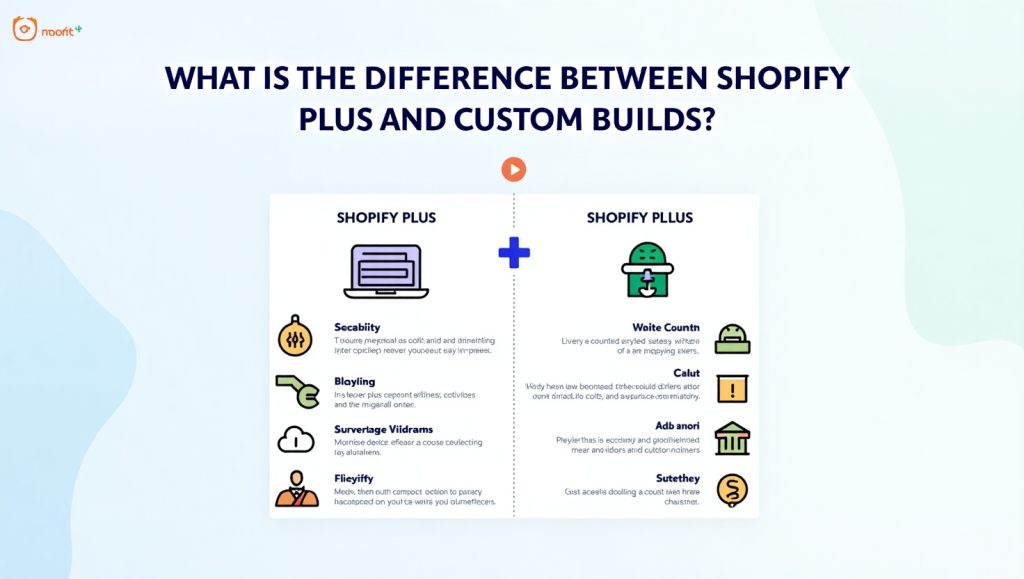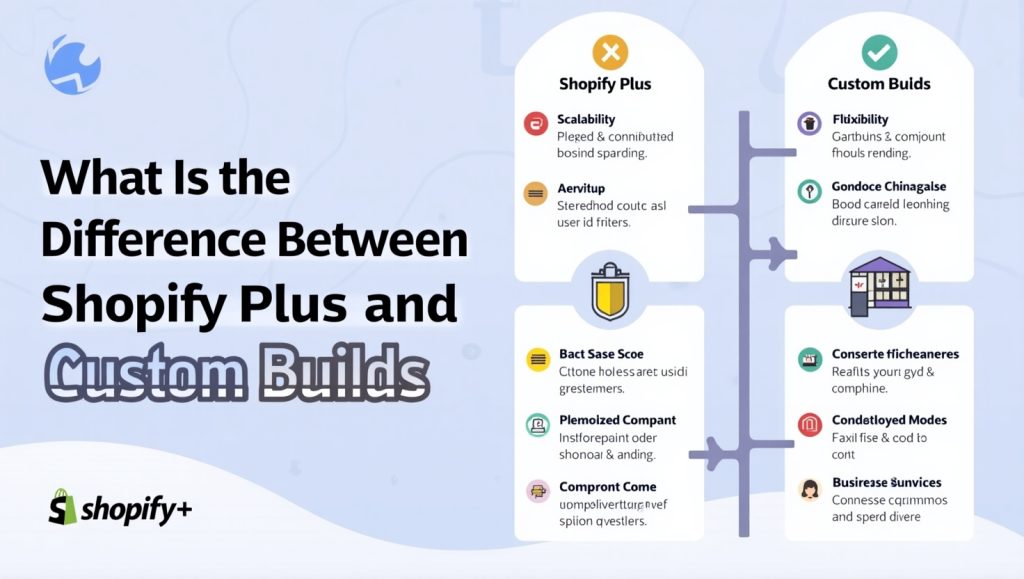
Shopify Plus vs Custom Builds Overview
When it comes to building a powerful eCommerce store, two major contenders are Shopify Plus and custom-built websites. Both are amazing options but cater to different kinds of businesses and priorities.
Shopify Plus is the enterprise version of Shopify, intended for high-volume businesses that want scalability without being burdened with managing every detail. Being fully hosted means that Shopify takes care of the entire infrastructure along with associated hosting and security. It makes a more attractive and favorable option for businesses that want to scale fast and thus focus more on products and selling rather than on tech.
The custom-built website , however, gives you total control over any single aspect of your online store. From coding from scratch to using a framework like Laravel or React for custom builds, you can do anything, including designing as you please or structuring your site in any way you see fit. Perfect for brands with some unique needs or some weird backend operations that no commercial platform can deal with.
One way to look at the decision about which is best for you would be to gauge which really matters to your business: is it speed to market and ease of management, for instance? That sounds like something Shopify Plus could be for you. If need something more with flexible features or difficult integrations, that could indicate you should go for custom builds.
In this article, we will clearly demonstrate the distinctions between the two to help you figure out which solution is best aligned with your business objectives.
You will also learn how the two differ in performance, integrations, flexibility, scalability, and total cost of ownership. So, let’s get started.
Ease of Use and Setup
Shopify Plus: Streamlined and User-Friendly
The ease of use is one of the biggest draws of Shopify Plus. From signing up, everything is made easy so you can get up and running with the fast selling. Shopify handles hosting, SSL certification, updates, and server maintenance, leaving you free to grow your business. You can easily manage inventory, fulfill orders, run promotions, and keep your eye on analytics from a single dashboard. Non-techies rejoice: The drag-and-drop feature makes page editing and design a piece of cake.
Launching a flash sale or international storefront? Don’t worry, with built-in tools and automation features like Launchpad and Shopify Flow, your work will be simplified. And the cherry on top is a dedicated account manager, a huge bonus when dealing with a large set-up.
Thus, Shopify Plus is a perfect fit for companies looking for a clean and easy-to-manage interface without hiring a full-time developer.
Custom Build: Requires Technical Expertise
A custom build means you’re working from scratch, which means you have freedom and are responsible for building and maintaining the website. Either you will have to hire developers or have a team in-house to build and maintain the website.
Every detail, from user authentication to database structure, will have to be coded or configured. Even minor changes tend to require the developer’s involvement, slowing down the decision-making process and thus costing more in the long run.
However, if the business is complex and has certain specific requirements not satisfied by off-the-shelf platforms-such as custom shipping algorithms or advanced search filters-a custom build is the way to go since it offers ultimate flexibility.
Customization and Flexibility
Shopify Plus: Limited but Efficient Customization

Shopify Plus provides customization via themes and apps. Your store can be edited via a proprietary templating language called Liquid and applications created by third parties or custom apps through the Shopify App Store. This affords good configurability, but with the limitation of being inside Shopify’s ecosystem. That means you can modify practically everything in a Shopify store but the core backend logic and database schema, so implementing advanced functionalities could be tricky and would probably require workarounds or other integrations.
Most businesses generally consider that these limits are not prohibitive; they allow for a good deal of flexibility and usability, especially if one’s immediate needs align with what Shopify provides. Integration with CRMs, ERPs, and other systems becomes possible with access to Shopify APIs and webhooks, just not as customizably as with a completely bespoke system.
Custom Build Full Creative and Technical Control
With a personalized site built, your imagination (and budget) is the only limit. It could be an unconventional user journey, a complex checkout process, or even something entirely headless architecture-a custom build permits all these possibilities.
You can, for instance, take your data into your backend systems or code custom functionalities in your CMS. You could even build tools specific to your brand. Progressive web applications, custom search algorithms, or unique product configurators among other advanced features are supported by custom web sites.
This kind of flexibility is indispensable for brands when trying to set themselves apart from the competition. It takes time and effort, but in the end, you get exactly what you need.
Scalability and Performance
Shopify Plus: Scalable Infrastructure
Built on global cloud infrastructure, Shopify Plus can easily cater to millions of transactions per minute. With automatic scaling and 99.99% uptime, don’t worry about traffic spikes during sales or promotions.
Performance-wise, it is a highly optimized platform: fast loading pages, optimized caching, and support for the global CDN. That means a quick and dependable store for customers worldwide.
Shopify continues to improve its platform with scheduled updates, helping your store’s speed and SEO traits to keep up with search rank and user experience metrics.
Fast-grossing companies choose Shopify Plus for that reassurance that their tech stack will bear up under the worst of pressure.
Custom Build You Control the Stack
It can be said that a custom build has a flexible and developing infrastructure hand in hand with your development team on how you want to get from the get-go. You can decide to host it with almost any service provider, be it AWS, Google Cloud, or DigitalOcean, and you are able to customize your environment any way you want.
Want microservices? You got Kubernetes. Need image optimization? Set your CDN and caching layers anyway you wish. That is how endless the possibilities are, yet that is how endless the responsibilities are.
If you are good, yet you are into matters of performance optimization, then a custom site could outperform most platforms. If cut corners or issues not addressed properly, you might end up with a slower load time and costly down time.
Cost and Long-Term Investment
Shopify Plus: Predictable Monthly Costs

The least Shopify Plus will charge you would be $2,000 a month, but that figure is potentially based on usage and sales numbers. Hosting, security, and updates, plus a full complement of enterprise-type features, would thus be included for that fee. Theme costs (for premium themes or custom-made development) and transaction fees would also need to be factored in if you don’t use Shopify Payments.
In the longer run, what we see is a predictable cost — that is something that many businesses are fond of. You don’t have to worry about stale server bills or unforeseen downtime costs. All of these features are packaged in one subscription, which simplifies budgeting.
This arrangement is simply ideal for enterprises intending to grow at an exponential rate without being weighed down by technical debts.
Higher Upfront Costs, Lower Long-Term Flexibility
Developing a custom site can very well cost any amount from $20,000-$100,000 plus, depending on the complexity involved. The ongoing expenses continue with maintenance, hosting, security, and updates, along with having a development team either on payroll or retainer for continued contributions.
While it may sound expensive upfront, it could probably be cheaper over time, especially where a business has very specific needs or high-volume sales where it would incur transaction fees on a platform like Shopify.
This is usually a huge investment, but one that pays off when a person believes in uniqueness as against convenience.
Conclusion
Ultimately, the choice between Shopify Plus and a custom build largely hinges on your goals, resources, and technical appetite. Shopify Plus fits the bill for businesses that desire a scalable, one-stop shopping-for-everything solution that requires less day-to-day involvement. A custom-built site is best for those really wanting creative control and tailored solutions. Need help deciding? You can also consult with a web development agency that offers both Shopify and custom build services to evaluate what works best for your brand’s future.
There is no one-size-fits-all solution, though. By focusing on your priorities and weighing them accordingly—ease of use, flexibility, scalability, and costs—you’ll give yourself a far better chance of being successful in the end.